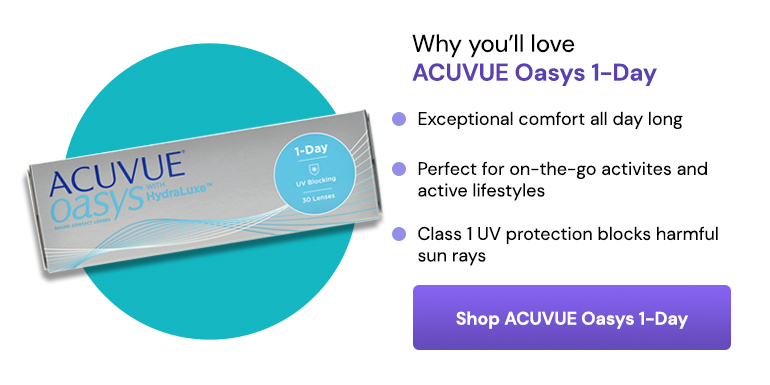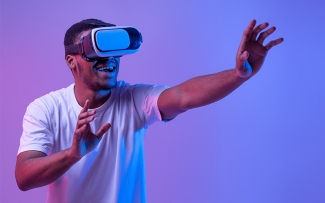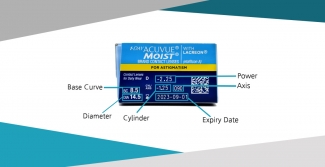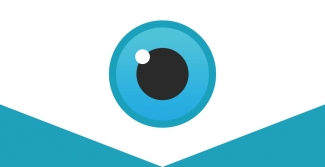Virtual reality with contact lenses and glasses
Dreaming of exploring distant worlds from the comfort of your own home? You're just a headset away from making it happen.
While the promise of a truly immersive virtual reality (or VR) experience has been teased for decades, the pixels in that picture didn't always add up. But with the recent spate of major tech players like Apple, Sony PlayStation, and Meta throwing their virtual hats into the ring, this unique form of entertainment is going mainstream.
For those of us who wear glasses or contact lenses on a regular basis and want to experience the wonders of VR, here's how to put this exciting technology into focus.
What are virtual reality headsets?
To begin your journey in a new digital environment or metaverse, you'll need a piece of equipment known as a virtual reality or VR headset. A VR headset is a device strapped around the head that uses a goggle-like viewport to cover the user's field of vision.
Some entry-level headsets support a smartphone insert, while others provide a high-tech display to completely cover the eyes for immersive 3D experiences. Headsets use stereoscopic sound and imaging along with gyroscopic sensors and accelerometers to maintain orientation with the user's physical position in the real world to sync this experience.
Can you use virtual reality with contact lenses?
Yes. If your eyesight requires vision correction, contact lenses are generally the best and most comfortable option to use with virtual reality headsets. When using a VR headset, your prescription lenses should do the trick to provide clear and comfortable vision while exploring the virtual world around you.
Benefits of wearing contact lenses with VR
Because contact lenses sit directly on the eye's surface, they provide a more immersive VR viewing experience. Here are a few other reasons why contacts tend to be the best choice to pair with your VR device:
- Contact lenses provide a wider range of peripheral vision than glasses.
- VR gaming and experiences often require agile movement or exercise, which can fog up glasses worn under the headset.
- Without bulky frames, virtual reality headsets fit more comfortably on the user's head.
- Glasses can potentially scratch the interior of the headset or break under pressure from the straps.
- Glare from the VR headset may appear on glasses lenses, which isn't a factor when wearing contacts.

Can you use virtual reality with glasses?
In most cases, yes, but it also depends on the virtual reality headset manufacturer. While many headsets take spec wearers into account, not all do. Therefore, there's no guarantee that every headset will fit comfortably with your glasses, especially if they have a unique frame or oversized shape.
If you plan to purchase your own VR headset and will regularly wear your glasses while using it, visit a store to test and gauge the comfort of your VR experience when wearing them.

What are VR prescription lenses?
As an alternative to contact lenses and glasses, many VR headsets allow for prescription lens inserts or adaptors to provide vision correction whilst wearing them. While they solve the issue of bulky frames interrupting your VR experience, these custom-made lenses can become quite costly and are an added expense to an already high-priced device like a VR headset.
Also, due to the nature of eyesight changing over time, you'll need to regularly replace your prescription lens inserts to maintain the best 3D experience. Another thing to consider is that there are only a few manufacturers of these speciality lenses, resulting in limited options that are rarely interchangeable between different headset styles.
While they eliminate the awkwardness glasses cause underneath headsets – so do contact lenses, which tend to be a more practical and budget-friendly option.
Are virtual reality headsets harmful to your eyes?
While there's no evidence that VR headsets can cause long-term damage to eyesight, they aren't without potential worries. As with many digital devices, time spent viewing screens tends to reduce the eye's normal blinking rhythms, leading to fatigue and dry eyes – commonly known as digital eye strain.
"Cybersickness" can also affect some VR users, which includes symptoms like dizziness, headaches, and problems focusing. In some instances, users of virtual reality headsets have also reported temporary changes to depth perception and spatial awareness.
For contact lens wearers, the main problems with excessive VR usage are dry eyes and discomfort caused by interrupted blinking patterns. These side effects are easily remedied by monitoring your time spent using the headset, practising the 20-20-20 rule, and taking frequent breaks to apply refreshing eye drops suited for lenses.
If you experience any changes in your vision or eye pain, we recommend you stop using the VR headset and contact an eye care professional to assess the situation.

Do virtual or augmented reality contact lenses exist?
Once the plotline of Sci-fi movies and popular TV shows like Black Mirror, augmented or "smart" contact lenses might become a reality in the next few years. Several tech companies are pioneering augmented reality built directly inside a contact lens-like device.
Unlike virtual reality, these lenses will utilise the concept of augmented reality. This means that digital information or visual elements are displayed alongside or on top of a view of the physical world. In contrast, in a VR experience, all visuals are digitally viewed in an alternate setting.
Using an AR framework, you'll be able to access information directly in front of your field of vision instead of having to look down at your phone. Imagine a weather update or directions to the airport instantly appearing in front of your eyes, all while being able to observe the world around you. Reaching into your pocket to read a message on your smartphone will be a thing of the past.
Want to learn more about these new cutting-edge concepts? Take a deeper look into the future of contact lenses here.








